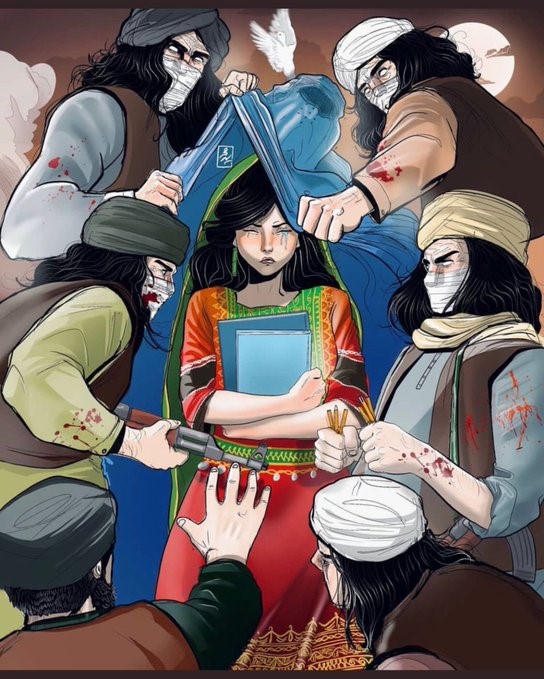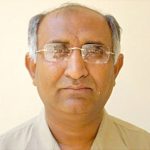
Political and economic insecurity, educational inequality, sexual violence, and poor health are common among Afghan women and children under the Taliban.
Prof Dr. Abdullah G Arijo
This could be anything, but, not religion. The very teaching “Learn from cradle to grave” one must never forget, is the essence of Islamic ideology.
Afghanistan is currently one of the most difficult countries in the world when it comes to a woman. Political and economic insecurity, educational inequality, sexual violence, and poor health are common among Afghan women and children.
However, when allowed to work in the mainstream, the female folk contribute and produce their utility as an effective tool for society and can change their lives, regardless of circumstance.
But under the new administration, once again Taliban security forces in the Afghan capital have recently enforced a higher education ban for women by blocking their access to universities, which had made women weep and console each other outside the university campus in Kabul.
The Taliban-led administration did not give the reason for the ban however, the world reaction compelled the Taliban’s higher education minister to defend the ban on women from universities.
The very reason behind the ban has been aimed at the prevention of “Mixing Genders” in universities because the higher education minister believes “some subjects being taught violated the principles of Islam.
Afghan women have registered their anger over the ban as the Taliban begin enforcement. While in an interview with Afghan television, Afghan official, Nadim pushed back against the widespread international condemnation, including from Muslim-majority countries such as Saudi Arabia, Turkey, and Qatar. Nadim said that foreigners should stop interfering in Afghanistan’s internal affairs. However, the majority view is that higher education is a basic human right and Afghanistan is not a special entity.
The print and electronic media across have shown its reaction and the foreign ministers of the G-7 group of states urged the Taliban to rescind the ban, warning that “gender persecution may amount to a crime against humanity.” The ministers warned after a virtual meeting that “Taliban policies designed to erase women from public life will have consequences for how our countries engage with the Taliban.” The G-7 group includes Canada, France, Germany, Italy, Japan, the United Kingdom, the United States, and the European Union, but all seem to go in veins as Afghan rulers have different blood and flesh.
The definition of Islam with the Taliban is unique. As a matter of fact, women’s higher education has great importance. For instance, in certain procedures of medical nature, particularly those associated with gynecology, either a female subjected to reproductive ailments must be treated by male medical staff, which again may be a major concern in conventional societies, or the poor patient has no choice but to die in cold blood.
As a human, both males and females must enjoy equal opportunity. Even in the west, women were deprived of the right to vote till the middle of the 20th century, which is an injustice.
In Islam, education is a divine command for both men and women. The Quran as well as the hadith leave no doubt that women, like men, are obligated to increase their knowledge and pursue it. But, when it comes to women, the attitude and approach are based on ill arguments. Why and who we are to decide what the women must do the way we want. They are human beings with all those sentiments as with man, but the game of exploitation never ends in Afghanistan.
Women and girls have been victims of ruthless power struggles for centuries in all societies and cultures around the world. This hegemony over women has been exercised in the form of Sati, Karo-Kari, and the killing of witches, which are only a few to mention. Sadly, but truly, many societies including some Muslim societies continue to exercise this patriarchy in different forms such as the denial of education, unequal salaries compared to men in workplaces, forced marriages, and prostitution, among many others.
Prophet Muhammad, peace be upon him (PBUH), came at a time when the Arab society was lurking in the lake and there was huge discrimination against women, and prophet (PBUH) preached Islam, liberating women and girls in every walk of life, education.
In another act, bas have been imposed on women to work in NGOs. The rulers justified the move by saying female NGO staff had broken dress codes by not wearing hijabs. The decree comes on 24th December, just a few days after female students were banned from universities. The US Secretary of State also criticized the move saying it would be “devastating for the Afghan people”.
Quite a big number of females who work for NGOs and earn their livelihood have expressed their fear and helplessness, saying “If they cannot go to their job, who can support their families?” For many women, who are breadwinners for their families, it is “shocking” as women who are the sole supporters of their kin must face the Taliban’s “Islamic morals” and struggle otherwise, to pay their utility bills and manage everything as there is no social security mechanism in Afghanistan.
Women’s right of seeking higher education cannot be compromised as gender equality is a human right, and the issue needs to be addressed with the present-day situation hence, we need to ensure advances through dynamic social programs and not deprive women of our own interpretations of Islamic laws. In addition, there is a dire need to embark upon the Gender Equity Initiative to curb this curse.
__________________
 Prof. (R) Dr. Abdullah G. Arijo is Advisor and Visiting Professor Shaheed Benazir Bhutto University of Veterinary and Animal Science, Sakrand, Sindh Pakistan. Formerly, he was Chairman, Department of Parasitology, Sindh Agricullture University Tando Jam. After retirement, he also served there as Advisor Academics & P&D to Vice Chancellor. He can be reached at Email: abdullaharijo.faculty@sbbuvas.edu.pk
Prof. (R) Dr. Abdullah G. Arijo is Advisor and Visiting Professor Shaheed Benazir Bhutto University of Veterinary and Animal Science, Sakrand, Sindh Pakistan. Formerly, he was Chairman, Department of Parasitology, Sindh Agricullture University Tando Jam. After retirement, he also served there as Advisor Academics & P&D to Vice Chancellor. He can be reached at Email: abdullaharijo.faculty@sbbuvas.edu.pk